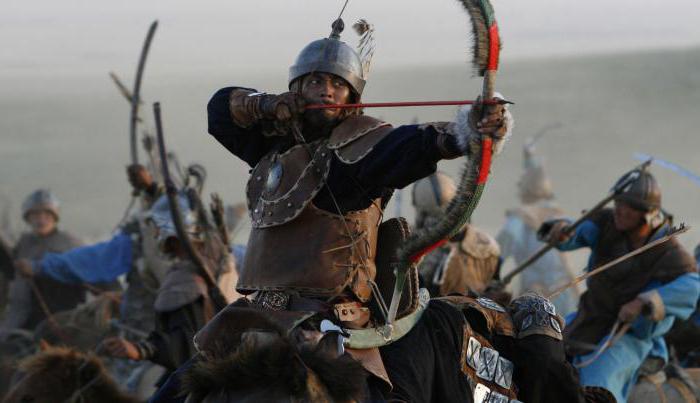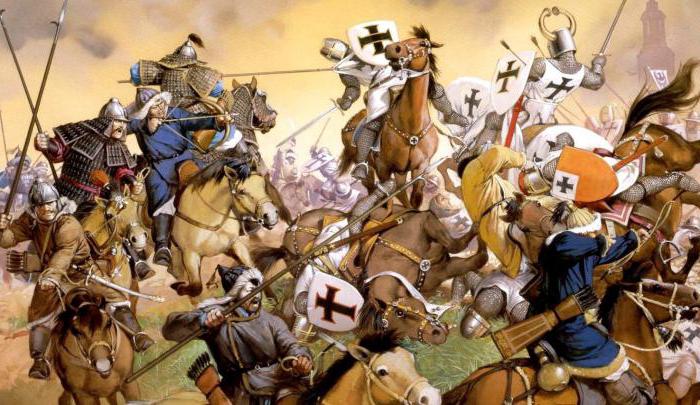
The education of the Mongolian state is attributed by historiansto 1206 year. Its conquests were enormous: China, all of Central Asia, Transcaucasia, Russia, the Middle East, Hungary. The final disintegration can be considered the year 1480, when the tribes lost their fighting spirit, dispersed and began to engage only in cattle breeding in their native steppes.

Education of the Mongolian state is obliged to allTemuchin (Temujin), as his name was in his youth. His father, Esigey of the Bordzhigin clan, kidnapped a beautiful wife in the Merkite tribe when she was already married. She had a son Temujin in the middle of the 12th century in the ulus, who wandered along the banks of the river Omon. When Esaihei himself was poisoned by the Tatars, Temujin and his family were expelled from their native places. The Tatars became Temujin's personal enemies. Temujin captured Taichiuty, so that the growing boy could not avenge his father and regain his lands. Temuchin managed to escape, he found a twin brother of his father, who had protected him, married his intended bride Borte, and began to strengthen his forces, raiding the neighboring uluses. He did not kill the captives, but took them to his service.

The main wealth of the nomads was cattle andpastures. Seeking to get as many cattle as possible, they mastered more and more new pastures - the old ones were depleted. Traditional territories of nomadic cattle have become tight for herds and flocks. That case erupted tribal conflicts. The nomadic system was replaced by "nomadic feudalism". This contributed a lot to the energetic and talented commander Temujin. In addition, the Chinese, in order to remain calm at home, sowed feud between the nomadic tribes. Many fights were held by Temuchin, before he subordinated the tribes of the Tatars, Taychyut, Merkit, Oirats. By 1206 under his power was the whole of Mongolia. On the kurtulai (the congress of all the Mongolian khans) Temuchin received the title "kagan" and took the name Chingiz, which meant "the ocean" or, in another version, "the chosen one of the sky." The reasons for the formation of the Mongolian state:
Genghis Khan also mixed the nomads from different tribesand genera was a strictly organized army. Discipline and mutual assistance in it were iron. If one was running from the battlefield, then they executed a dozen, which he entered. Of the dozens were made hundreds, hundreds of thousands, of thousands - tumen (10 thousand people). For an unauthorized transition from one dozen to another executed. Only personal abilities and devotion to the khan now helped to advance in the service.

When preparations were made for a war with China,the formation of the Mongolian state continued. The reasons, the course, the results are partly examined. Formally, Mongolia was a vassal of the Jurchen tribes who lived in the Primorsky Territory, Korea, Northeast and Central China. In 1209, the Mongols used siege weapons and captured the city of Urahai, besieged the capital of the kingdom of Xi Xia. The ruler asked for peace and married his daughter to Genghis Khan. So military experience was acquired, and Mongolia expanded. To this dangerous neighbor voluntarily joined the Uighurs who lived in Xinjiang. In 1210, this example was followed by two more khans. The land and the army of the Mongols increased. Genghis Khan was preparing to conquer the settled state of Qin. In 1213 the Mongol troops invaded the empire. The huge army was divided into 3 parts and conquered the east, south and southeast. Beijing paid off.

In 1218 the Mongols conquered Semirechye andEast Turkestan is the land of the Naimans, and the road to Khorezm, Bukhara, Samarkand, Urgench opened before them. The cities were taken and destroyed. The Mongols professed the principle of "scorched earth". When the eldest son of Genghis Khan began to protest, because it was his ulus, and he wanted to leave him rich for himself, a month later he died of a poisoned arrow. In 1220, Northern Iran, Transcaucasia and the Crimea were conquered.
In 1223 the Mongol princes arrived to the Russian princesambassadors. They were killed. The Mongols did not forgive this attitude to the embassy, and after the defeat of the united forces of the Russian princes in the battle on the river Kalka, a feast was held. They laid the boards on still living prisoners and sat on them, making a celebration to the cries of painfully dying people. It is amazing that the Mongols were only 20 thousand, and the number of Russian and Polovtsian troops varies from 40 to 100 thousand according to different estimates. In the meantime, Genghis Khan detachments reached the Indus. So the formation of the Mongolian state took place. In short, we can add that in 1241, when Rus was conquered and burned, the Mongols reached the Danube, Hungary and Poland.

Formation of the Mongolian state of Genghis Khanoccurred in the most violent wars of conquest. Mercy was not for anyone. There was fear and horror in Russia after the arrival of Baty's troops. Gradually the Mongolian khans found the capital, became less energetic. Quarrels broke out between them more often. Meanwhile, Rus strengthened, and ended with the yoke standing on the river Ugra.
In Russia the autocracy was consolidated, strengthenedOrthodox Church. There remained the Kazan Khanate, which was defeated by Ivan the Terrible, liberating about 60 thousand Russian slaves. In Kazan, the Tatars lived peacefully, becoming Muslims from the Gentiles. Remained a fragment of the Mongol empire in the Crimea. He was subdued by the Most Serene Prince Potemkin. The city of Kasimov continued to exist in Ryazan province, where the Tatars had long settled. In the XV century, when the Golden Horde broke up, the Siberian Khanate appeared in the lower reaches of the Ob River. Only Ermak's detachments and the subsequent development of Siberia in the 16th century allowed Russia to build new fortresses on its borders.
</ p>